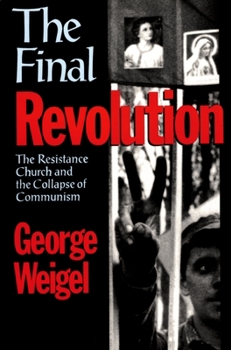The Final Revolution: The Resistance Church and the Collapse of Communism
Select Format
Select Condition 
Book Overview
The collapse of communism in central and eastern Europe--the Revolution of 1989--was a singularly stunning event in a century already known for the unexpected. How did people divided for two generations by an Iron Curtain come so suddenly to dance together atop the Berlin Wall? Why did people who had once seemed resigned to their fate suddenly take their future into their own hands? Some analysts have explained the Revolution in economic terms, arguing that the Warsaw Pact countries could no longer compete with the West. But as George Weigel argues in this thought-provoking volume, people don't put their lives, and their children's futures, in harm's way simply for better cars, refrigerators, and TVs. Something else--something more--had to happen behind the iron curtain before the Wall came tumbling down.
In The Final Revolution, Weigel argues that that "something" was a revolution of conscience. The human turn to the good, to the truly human, and, ultimately, to God, was the key to the political Revolution of 1989. Weigel provides an in-depth exploration of how the Catholic Church shaped the moral revolution inside the political revolution. Drawing on extensive interviews with key leaders of the human rights and resistance movements, he opens a unique window into the soul of the Revolution and into the hearts and minds of those who shaped this stirring vindication of the human spirit. Weigel also examines the central role played by Pope John Paul II in confronting what V clav Havel called communism's "culture of the lie," and he suggests what the future role of the Church might be in consolidating democracy in the countries of the old Warsaw Pact.
The "final revolution" is not the end of history, Weigel concludes. It is the human quest for a freedom that truly satisfies the deepest yearnings of the human heart. The Final Revolution illustrates how that quest changed the face of the twentieth century and redefined world politics in the year of miracles, 1989.
In The Final Revolution, Weigel argues that that "something" was a revolution of conscience. The human turn to the good, to the truly human, and, ultimately, to God, was the key to the political Revolution of 1989. Weigel provides an in-depth exploration of how the Catholic Church shaped the moral revolution inside the political revolution. Drawing on extensive interviews with key leaders of the human rights and resistance movements, he opens a unique window into the soul of the Revolution and into the hearts and minds of those who shaped this stirring vindication of the human spirit. Weigel also examines the central role played by Pope John Paul II in confronting what V clav Havel called communism's "culture of the lie," and he suggests what the future role of the Church might be in consolidating democracy in the countries of the old Warsaw Pact.
The "final revolution" is not the end of history, Weigel concludes. It is the human quest for a freedom that truly satisfies the deepest yearnings of the human heart. The Final Revolution illustrates how that quest changed the face of the twentieth century and redefined world politics in the year of miracles, 1989.
Format:Paperback
Language:English
ISBN:0195166647
ISBN13:9780195166644
Release Date:September 2003
Publisher:Oxford University Press
Length:255 Pages
Weight:0.96 lbs.
Dimensions:0.8" x 6.1" x 9.4"
Customer Reviews
1 rating
A thorough, fascinating, scholarly book, easy to read.
Published by Thriftbooks.com User , 29 years ago
This book tells the fascinating story of the role of the church, particularly the Roman Catholic church, in the collapse of communism in eastern Europe and the Soviet Union. This subject has received precious little coverage in the popular press, but cannot be ignored by serious students of history. The author takes the position that it was neither Mikhail Gorbachev, nor Ronald Reagan alone that did it (brought down the Yalta imperial system), but the undeniable and inexorable faith of many Christians throughout Europe. The collapse of Communism had its roots in the early work of Pope Pius, Pope John XXIII, Paul VI and finally the Polish pastor/dramatist/linguist Karol Woytyla, who became Pope John Paul II. The close identification of Catholicism with the Polish history kept the national character alive and ultimately denied the power of tyranny in Poland and elsewhere. I recommend this book to anyone who is skeptical of the biases of the press






